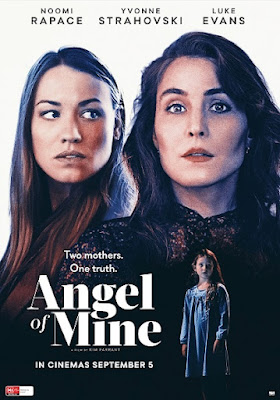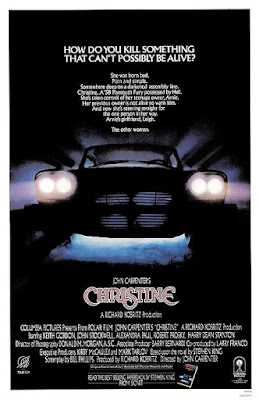Today I have the immense pleasure of welcoming a very special guest, actress Tracy Mann, to CINEMATIC REVELATIONS for an interview. Tracy has acted in many motion pictures over the years such as HARD KNOCKS, GOING DOWN, FAST TALKING, THE BOX [my review of the film can be found here] RECKLESS KELLY, FELONY, SLEEPING BEAUTY, ANGEL OF MINE and TOP END WEDDING. Tracy has also been very active in theatre over the years, starring in many notable plays and musicals. In this interview Tracy will be discussing her part in THE BOX movie, acting, cinema, theatre, and television.
Welcome to CINEMATIC REVELATIONS Tracy!
Athan: When did you first realize that you wanted to be an actress?
Tracy: When I was 4 I believe I said to my parents ‘I want to be an actress’! My mother thought I’d grow out of it. I never did!
*
Athan: Where did you study acting?
Tracy: I come from the school of hard knocks. Drama classes as a child, then as a teenager with the Saturday Company, a branch of the SATC in Adelaide. I went straight from my final exam in high school to rehearsals at the Adelaide Festival Theatre for Winnie the Pooh. I joined Actors Equity then. It was 1973. I finally began studying in London with Phillipe Gaulier in the 90s. I have worked with many wonderful teachers over the years. Lindy Davies being one.
*
Athan: Your performance as Tina Harris in THE BOX could be described as being the film’s conscience, providing it with a sympathetic moral centre among the movie’s derring-do. What is it that you most enjoyed about playing Tina in THE BOX movie?
Tracy: You must remember, I was 17 years old when I did THE BOX movie. So everything was exciting and new and fun. We were on location at Eildon Weir staying in a local motel and Graham Kennedy was in the room next to me. He arrived in his Rolls Royce. But Tina, was a great role for me because we grew together. Her journey was mine. A fortunate beginning to my career.
*
Athan: THE BOX had an excellent ensemble cast including Ken James, Paul Karo, Barrie Barkla, Lois Ramsey, and Fred Betts. What was it like working with these performers in the film?
Tracy: In my day, (I feel I can say that at my age!) actors working in soap were older and very experienced and many were theatre actors. So I learnt professionalism from these wonderful actors and actresses. That was my ‘acting school’. Also working for 18 months on the series gave me muscle to act swiftly and decisively. And learn lines quickly. And forget them just as fast!
*
Athan: What did you find most exciting about the experience of making THE BOX movie?
Tracy: Everything was exciting in those days!!
*
Athan: For you, what was the most demanding, but emotionally satisfying segment of filming THE BOX movie?
Tracy: I reiterate, I was a mere 17. Demanding and emotionally satisfying weren’t yet terms in my lexicon! But I will say when Ken James dropped his towel, it was A SHOCK!!!
*
Athan: Have you kept in contact with any cast members and crew from THE BOX?
Tracy: I remained friends with Lois Ramsey until she passed away. She was a very dear and valued presence in my life.
*
Athan: THE BOX was directed by Paul Eddey, who mainly directed and produced episodic television, and for whom THE BOX was his sole movie credit. How was the experience of being directed by Mr Eddey in THE BOX?
Tracy: As it was my first movie too, I had nothing to compare the experience to. But I remember he was a very nice man.
*
Athan: You have been in many stage plays over the years, with ‘The Graduate’, ‘Minefields & Miniskirts’, ‘Two Weeks With The Queen’, ‘Noises Off’, ‘Blithe Spirit’, just some of the productions in which you have starred. What is it about the theatre that you most enjoy?
Tracy: Collegiality. Community. Immediacy. Working with great texts, and time to rehearse and explore. Audience response. Not the nerves, or the late nights though!
*
Athan: In addition to film and the theatre, you have also acted in a multitude of television series over the years, with classic programs such as The Box, Matlock Police, The Young Doctors, The Sullivans, Prisoner, Sweet & Sour, Skirts, Janus, G.P., and more recently on Wonderland, and Rake and Five Bedrooms. In terms of comparing and contrasting acting on film, and acting on television, what differences are most evident from your experience?
Tracy: Film and television acting requires subtly, small gestures, minimal expressions. You can be quiet. And redo take after take. Theatre requires muscle, vocal and physical presence. Working with the audience, their breath, their laughter. It involves stage craft, finding your light, sharing intimate moments with 500 people demands different skills to film and television. But all mediums need ‘truth’. Putting your attention on the ‘other’. And being present. Listening. LISTENING is key.
*
Athan: In 1980 you won the AFI (Australian Film Institute) Award for Best Actress in feature film HARD KNOCKS. How did it feel to be acknowledged in this manner for your performance in the movie?
Tracy: It was a very special moment to hear my name called out. I remember bursting out of my seat in the (now sadly demolished) Regent Theatre in Sydney and running up the aisle in my Linda Jackson green silk chiffon sheath! Glorious. I hadn’t prepared a speech but blurted out ‘thank you, thank you THANK YOU’, with beautiful Michele Fawdon and a spritely oldish Kirk Douglas presenting my award. You even got a monetary award in those days. Mr Douglas presented me with a $2,000 cheque and whispered, ‘you’re on your way kid’.
*
Athan: Do you have any upcoming projects of which you would like to tell readers?
Tracy: Yes I do, but in this climate, I think it’s prudent to keep things a bit quiet. So much can change. Nothing set in stone. But I’ll work for as long as I’m asked. I’m grateful to be able to participate in interesting projects and meet new creative people and still learn. It’s an adventure.
*
Thank you so much today for your time Tracy, and for the astute insight you have provided into the art of acting, THE BOX, cinema, theatre, and television. It has been wonderful having you on CINEMATIC REVELATIONS. You are welcome to return whenever you wish.
*







.jpg)



.jpg)

















.png)
